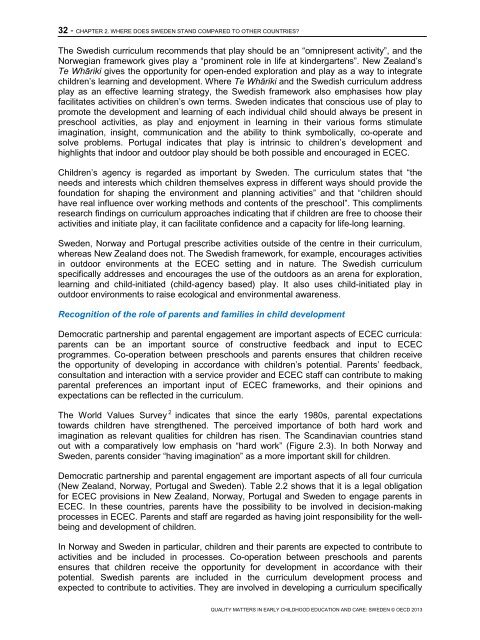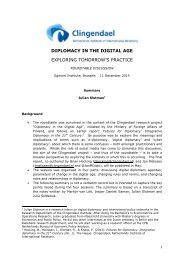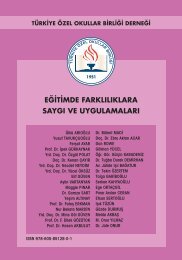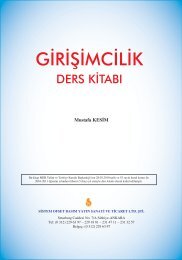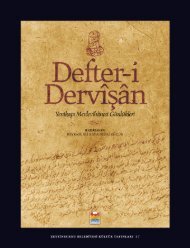SWEDEN%20policy%20profile%20-%20published%2005-02-2013
SWEDEN%20policy%20profile%20-%20published%2005-02-2013
SWEDEN%20policy%20profile%20-%20published%2005-02-2013
You also want an ePaper? Increase the reach of your titles
YUMPU automatically turns print PDFs into web optimized ePapers that Google loves.
32 - CHAPTER 2. WHERE DOES SWEDEN STAND COMPARED TO OTHER COUNTRIES?<br />
The Swedish curriculum recommends that play should be an “omnipresent activity”, and the<br />
Norwegian framework gives play a “prominent role in life at kindergartens”. New Zealand’s<br />
Te Whāriki gives the opportunity for open-ended exploration and play as a way to integrate<br />
children’s learning and development. Where Te Whāriki and the Swedish curriculum address<br />
play as an effective learning strategy, the Swedish framework also emphasises how play<br />
facilitates activities on children’s own terms. Sweden indicates that conscious use of play to<br />
promote the development and learning of each individual child should always be present in<br />
preschool activities, as play and enjoyment in learning in their various forms stimulate<br />
imagination, insight, communication and the ability to think symbolically, co-operate and<br />
solve problems. Portugal indicates that play is intrinsic to children’s development and<br />
highlights that indoor and outdoor play should be both possible and encouraged in ECEC.<br />
Children’s agency is regarded as important by Sweden. The curriculum states that “the<br />
needs and interests which children themselves express in different ways should provide the<br />
foundation for shaping the environment and planning activities” and that “children should<br />
have real influence over working methods and contents of the preschool”. This compliments<br />
research findings on curriculum approaches indicating that if children are free to choose their<br />
activities and initiate play, it can facilitate confidence and a capacity for life-long learning.<br />
Sweden, Norway and Portugal prescribe activities outside of the centre in their curriculum,<br />
whereas New Zealand does not. The Swedish framework, for example, encourages activities<br />
in outdoor environments at the ECEC setting and in nature. The Swedish curriculum<br />
specifically addresses and encourages the use of the outdoors as an arena for exploration,<br />
learning and child-initiated (child-agency based) play. It also uses child-initiated play in<br />
outdoor environments to raise ecological and environmental awareness.<br />
Recognition of the role of parents and families in child development<br />
Democratic partnership and parental engagement are important aspects of ECEC curricula:<br />
parents can be an important source of constructive feedback and input to ECEC<br />
programmes. Co-operation between preschools and parents ensures that children receive<br />
the opportunity of developing in accordance with children’s potential. Parents’ feedback,<br />
consultation and interaction with a service provider and ECEC staff can contribute to making<br />
parental preferences an important input of ECEC frameworks, and their opinions and<br />
expectations can be reflected in the curriculum.<br />
The World Values Survey 2 indicates that since the early 1980s, parental expectations<br />
towards children have strengthened. The perceived importance of both hard work and<br />
imagination as relevant qualities for children has risen. The Scandinavian countries stand<br />
out with a comparatively low emphasis on “hard work” (Figure 2.3). In both Norway and<br />
Sweden, parents consider “having imagination” as a more important skill for children.<br />
Democratic partnership and parental engagement are important aspects of all four curricula<br />
(New Zealand, Norway, Portugal and Sweden). Table 2.2 shows that it is a legal obligation<br />
for ECEC provisions in New Zealand, Norway, Portugal and Sweden to engage parents in<br />
ECEC. In these countries, parents have the possibility to be involved in decision-making<br />
processes in ECEC. Parents and staff are regarded as having joint responsibility for the wellbeing<br />
and development of children.<br />
In Norway and Sweden in particular, children and their parents are expected to contribute to<br />
activities and be included in processes. Co-operation between preschools and parents<br />
ensures that children receive the opportunity for development in accordance with their<br />
potential. Swedish parents are included in the curriculum development process and<br />
expected to contribute to activities. They are involved in developing a curriculum specifically<br />
QUALITY MATTERS IN EARLY CHILDHOOD EDUCATION AND CARE: SWEDEN © OECD <strong>2013</strong>


